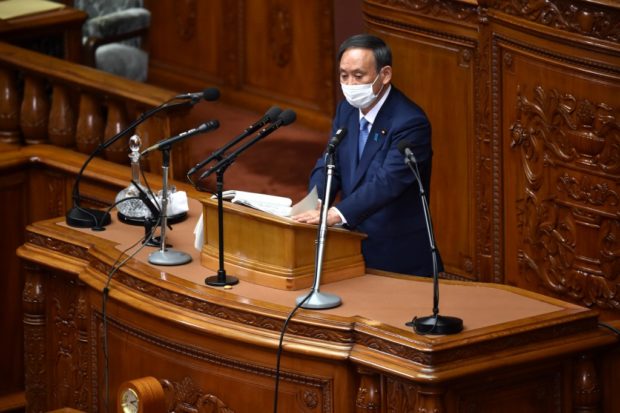Japan PM Suga sets 2050 deadline for carbon neutrality

Japan’s Prime Minister Yoshihide Suga wearing a face mask gives his first policy speech during an extraordinary session at the lower house of parliament in Tokyo on October 26, 2020. – Japan’s Prime Minister Yoshihide Suga sets a 2050 deadline for the country to be carbon neutral. (Photo by Kazuhiro NOGI / AFP)
TOKYO — Japan’s Prime Minister Yoshihide Suga on Monday set a 2050 deadline for the world’s third-largest economy to become carbon neutral, significantly firming up the country’s climate change commitments.
“We will bring the total amount of greenhouse gas (emitted by Japan) to net-zero by 2050, meaning carbon neutral,” Suga said in his first policy address to parliament since taking office.
“I declare we will aim to realize a decarbonized society,” he added, to applause from Diet members.
Tokyo had previously only aimed to achieve carbon neutrality sometime in the latter half of the century, a goal criticized by climate activists as vague and unambitious.
The new goal puts Japan on the same timeline as Europe, Britain, and a host of smaller nations, and a decade ahead of China, which last month set a 2060 goal.
Article continues after this advertisementSuga did not give precise details on how Japan, a country still heavily reliant on coal, will achieve the goal but said technology would be essential.
Article continues after this advertisement“The key is innovation,” Suga said, citing examples including next-generation solar batteries.
He said Japan would also push the use of renewable energy and nuclear power, stressing that safety would be a priority — a key point in a country that suffered the Fukushima nuclear disaster.
Japan, which is a signatory to the Paris agreement, was the sixth-biggest contributor to global greenhouse emissions in 2017, according to the International Energy Agency.
It has struggled to cut carbon emissions after shutting down nuclear reactors following the 2011 meltdown in Fukushima sparked by a devastating earthquake and tsunami.
Reliance on fossil fuels like coal increased after the Fukushima disaster, as public anger over the accident pushed all of the country’s nuclear reactors offline temporarily.
‘The time is right’
Japan has regularly come under fire for continuing to build coal-fired plants at home, as well as financing projects to build them abroad, notably in Southeast Asia.
The country’s 140 coal-fired power plants provide nearly a third of its total electricity generation.
The fuel is the second-biggest power-generation method behind LNG-fired plants, which provide 38 percent of the nation’s needs.
The new deadline is expected to shape the country’s basic energy plan, which is currently being revised.
The most recent plan, issued in 2018, aimed to have 22-24 percent of the country’s energy needs met by renewable sources including wind and solar by 2030, a figure critics called unambitious based on current levels of around 17 percent.
That plan also called for nuclear to provide more than 20 percent of the country’s energy needs by 2030.
Takaharu Niimi, a climate change specialist at the Japan Research Institute, told AFP that Suga’s announcement was in line with an international move towards stronger commitments on the environment.
In September, the world’s largest greenhouse gas polluter China announced it would be carbon neutral by 2060, a goal hailed by climate activists as a major step forward.
“Considering the international trend, I think the time is right for Japan to declare the plan,” Niimi told AFP.
“I see this announcement as being part of the broad trend.”